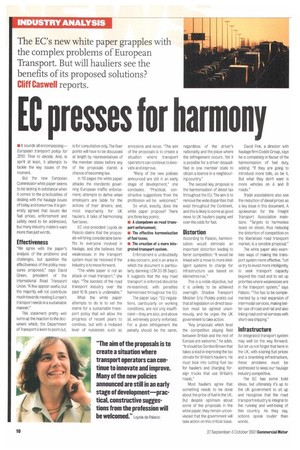EC presses for bar
Page 10

If you've noticed an error in this article please click here to report it so we can fix it.
• It sounds all encompassing— European transport policy for 2010: Time to decide. And, in spirit at least, it attempts to tackle the key issues of the moment.
But the new European Commission white paper seems to be lacking in substance when it comes to the practicalities of dealing with the haulage issues of today and tomorrow. It is generally agreed that issues like fuel prices, enforcement and safety need to be addressed, but many industry insiders want more than just words.
Effectiveness
"We agree with the paper's analysis of the problems and challenges, but question the effectiveness of the policy measures proposed," says David Green, president of the International Road Transport Union. "A few appear useful, but the majority will not contribute much towards meeting Europe's transport needs in a sustainable manner."
This statement pretty well sums up the reaction to the document which, the Department of Transport is keen to point out, is for consultation only. The finer points will have to be discussed at length by representatives of the member states before any of the proposals stands a chance of becoming law.
In 110 pages the white paper attacks the standards governing European traffic enforcement; attempts to define when employers are liable for the actions of their drivers; and, most importantly for UK hauliers, it talks of harmonising fuel taxes.
EC vice-president Loyola de Palado claims that the proposals will bring considerable benefits to everyone involved in haulage, and she believes that weaknesses in the transport system must be resolved if the industry is to move forward, "The white paper is not an attack or road transport," she says. "The success of the road transport industry over the past 10-15 years is undeniable."
What the white paper attempts to do is to set the scene for a sustainable transport policy that will allow the progress of recent years to continue, but with a reduced level of nuisances such as emissions and noise. "The aim of the proposals is to create a situation where transport operators can continue to innovate and improve.
"Many of the new policies announced are still in an early stage of development," she concludes. "Practical, constructive suggestions from the profession will be welcomed," So what, exactly, does the white paper propose? There are three key points: • A clampdown on road transport enforcement; • The effective harmonisation of fuel taxes; • The creation of a more integrated transport system.
Enforcement is undoubtedly a key concern, and is an area in which the document is particularly damning (CM 20-26 Sept). It suggests that the way road transport is enforced should be re-examined, with penalties harmonised throughout the EU.
The paper says: "EU regulations, particularly on working conditions, are not only insufficient—they are also, and above all, extremely poorly enforced. For a given infringement the penalty should be the same, regardless of the driver's nationality and the place where the infringement occurs. Yet it is possible for a driver disqualified in one member state to obtain a licence in a neighbouring country."
The second key proposal is the harmonisation of diesel tax throughout the EU. The aim is to remove the wide disparities that exist throughout the Continent, and this is likely to come as good news to UK hauliers paying well over the odds for fuel.
Distortion
According to Palacio, harmonisation would ekminate an important distortion leading to fairer competition: "It would be linked with a move to more intelligent systems to charge for infrastructure use based on kilometres run."
This is a noble objective, but it is unlikely to be achieved overnight. Shadow Transport Minister Eric Pickles points out that all legislation on direct taxation must be agreed unanimously, and he urges the UK government to take action.
"Any proposals which level the competitive playing field between Britain and the rest of Europe are welcome," he adds. "It should be Gordon Brawn that takes a lead in improving the tax climate for Britain's hauliers. He must look into cutting fuel tax for hauliers and charging foreign trucks that use Britain's roads."
Most hauliers agree that something needs to be done about the price of fuel in the UK. But despite optimism about some of the proposals in the white paper, they remain unconvinced that the government will take action on this critical issue. David Pink, a director with haulage firm Dodds Group, says he is completely in favour of the harmonisation of fuel duty, adding: "If they are going to introduce more tolls, so be it. But what they don't want is more vehicles on A and B roads."
Trade associations also see the reduction of diesel prices as a key issue in this document. A spokesman for the Freight Transport Association maintains: "Targets to harmonise taxes on diesel, thus reducing the distortion of competition on the liberalised road transport market, is a sensible proposal."
The white paper also examines ways of making the transport system more effective. "Let us try to invest more intelligently, to seek transport capacity beyond the road and to set up priorities where weaknesses are in the transport system,' says Palacio. "This has to be complemented by a real expansion of intermodal services, making better use of road and rail and also Inking road and rail services with short-sea shipping."
Infrastructure
An integrated transport system may well be the way forward. But let us not forget that here in the UK, with soaring fuel prices and a crumbling infrastructure, these problems must be addressed to keep our haulage industry competitive.
The EC has some bold ideas, but ultimately it's up to the UK government to sit up and recognise that the road transport industry is integral to the running and well-being of this country. As they say, actions speak louder than words.




































































































































